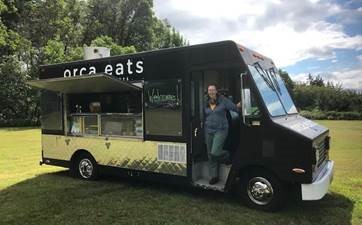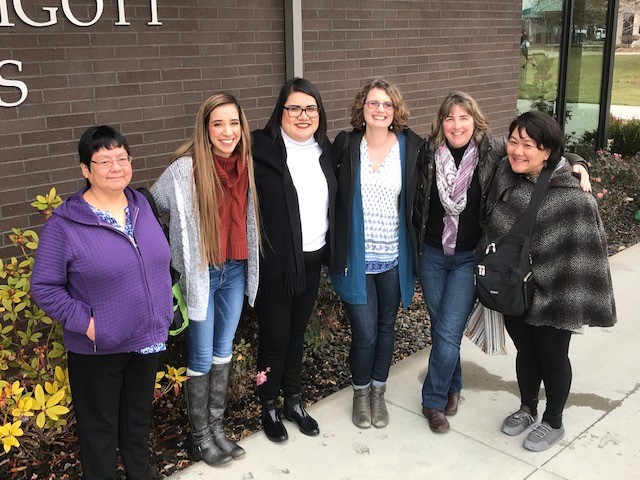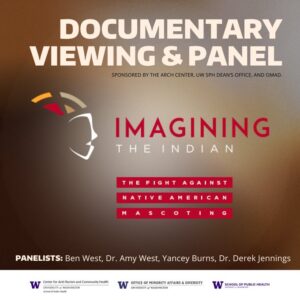From Trash to Treasure: How the South Park Biodigester is Bringing New Life to the Community
By Allie Long
What if our garbage didn’t end up in the landfill, but instead could transform into something that was life-giving and helpful? Fortunately, for residents of Seattle’s South Park neighborhood, this idea has become a reality.
The Duwamish Valley Sustainability Association (DVSA), together with support from the South Park community, University of Washington’s EarthLab, the EPA, Food Lifeline, the City of Seattle, Seattle Parks Foundation, Sustainable Seattle, ECOnorthwest, NextCycle and 360 Social, has spent the last several years creating the first community-owned biodigester in Seattle.
On October 11th, 2024, the DVSA team celebrated the biodigester’s opening week with colleagues and community members. After a brief introduction to the project, event participants were able to tour the biodigester, permanently installed in a truck bay at Food Lifeline.
How it Works
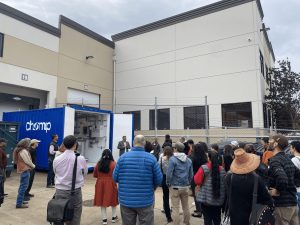
A biodigester is a sealed tank system that works because the anaerobic bacteria inside of it breaks down our organic waste – like old banana peels, used coffee grounds, and the takeout in your fridge that’s definitely past its prime – because of the absence of oxygen. This process then creates valuable resources like biogas (which is a type of renewable energy) and digestate (which is a nutrient-rich probiotic plant food that can be used as a fertilizer); both of which communities can use to sustainably generate energy while simultaneously reducing greenhouse gas emissions. The result is a hyper-localized circular economy that transforms waste into a resource—by and for community.
Why it Matters
Imagine a future where neighborhoods own and manage their waste systems, using food scraps to support local food production, improve air quality, and provide renewable energy. The biodigester project is a small but significant step toward building that future, where communities have greater ownership over the resources they create.
The hope is that this project will not only reduce waste and generate clean energy but also build healthier relationships with what we consume and what we leave behind. “By converting food waste into a resource, we’re creating a cycle that keeps the benefits directly in the community: providing healthy food for local gardens, teaching youth about sustainable systems, and inspiring new ways of thinking about waste,” shared Edwin Hernandez.

Furthermore, South Park is one of the lowest ranking areas on the Health Equity Index in the state of Washington with a 10 out of 10 severity rating. This means that people living here face higher rates of pollution and greater health risks than other Seattle residents.
“If we give youth, especially in our Latino community, the tools and opportunities to discover new careers related to STEAM (science, technology, engineering, art, and mathematics), they could be the future professionals who replace those currently working at the EPA, King County, City of Seattle, and Boeing…and who also have knowledge of how to work harmoniously with their community and achieve results,” shared Hernandez in an interview with the UW Center for Environmental Health Equity.
This is why the biodigester is more than a piece of green technology—it’s a symbol of what’s possible when residents and partners come together to build solutions that work for everyone. By piloting this project in South Park, DVSA is laying the groundwork for a model that could be scaled up to other neighborhoods in Seattle and beyond.
This work is part of the Just Circular Communities Collaborative (JC3), an initiative that seeks to envision and implement localized, regenerative, and community-driven circular systems for a Just Transition – by, with, and for Frontline communities.
How You Can Support This Work
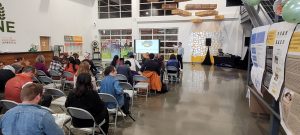
In order for this project to be efficient and economically viable, the team is currently in the process of raising money to purchase a truck and a utility trailer to transport food waste from across the South Park community to the biodigester. If you’d like to donate to this funding goal, visit the Seattle Parks Foundation website here.
South Park’s small but mighty biodigester will be able to process roughly 200+ lbs of organic waste per day, which will turn into around 79 million Btu of heat energy in gas per year and 180 gallons/week of probiotic plant food to boost local crops.
With so many gallons of probiotic plant food available, the DVSA team is also looking for additional local partnerships that would be interested in picking up fertilizer on a regular basis to keep the processing running smoothly. If you know any local farms that would be interested in partnering with DVSA in exchange for plant food, please email DVSA’s Project Manager Todd Schindler.
Happy Black History Month!
This year’s theme is Black Resistance: Sustaining, fortifying and respecting Black life.
The Movement
Black History Month came to us from Black historian, author and scholar Carter G. Woodson. Born in 1875 to illiterate parents who were formerly enslaved, he eventually became the second Black American to receive a PhD in History from Harvard University before joining the faculty at Howard University.
Despite his accomplishments, Woodson was barred from participating in American Historical Association conferences (even though he was a dues-paying member). According to the NAACP, this was part of Woodson’s realization that the white-dominated historical profession had “overlooked, ignored and even suppressed” African American contributions.
In 1926, Woodson created Negro History Week to promote and educate people about Black history and culture. This took place during the second week of February, coinciding with the birthdays of Frederick Douglass (a leader of the abolitionist movement) and Abraham Lincoln (for issuing the Emancipation Proclamation).
In 1976, the movement was officially recognized by President Ford as the month-long observance we celebrate today.
There is no American history without African American history.” – Sara Clarke Kaplan, Executive Director of the Antiracist Research & Policy Center at American University in Washington, D.C.
Today’s Moment
At EarthLab, we center equity and justice into our vision of the future, which means we must never forget the past in our thoughts because they influence our actions in the present.
We recognize that global events like COVID-19 and extreme weather disasters driven by climate change have worsened historical and current harm in addition to structural inequities, particularly towards Black, Indigenous and People of Color (BIPOC) communities. We believe sustainable environmental solutions come with the reckoning of this knowledge.
This month, we invite you to listen, learn, watch, support, and be in community with Black Resistance through resources and opportunities at UW and our community, some of which we’ve put together below!
Because it helps us to remember, there is no more powerful force than a people steeped in their history.”- Secretary Lonnie G. Bunch III, Smithsonian Institution
Listen & Learn
- UW Libraries Racial Justice Lib Guide
This is a starting point for students and faculty seeking to better understand issues related to racial justice and racism in America and includes a broad range of sources including current news, TED Talks, podcasts, social media and more.
This is a resource for anyone who wants to learn more about Seattle’s rich cultural heritage, including museums, historic sites, public art and neighborhoods that will give you an insider’s view of Seattle’s vibrant ethnic communities and unique history.
Watch Together
On May 5, 2022, EarthLab had a virtual conversation with Leah Thomas, founder of the Intersectional Environmentalist organization.
This event recording features Leah reading an excerpt from her new book, “The Intersectional Environmentalist: How to Dismantle Systems of Oppression to Protect People + Planet,” and a Q&A session with the audience.
You can watch the full recorded event below:
Support
Find a Black-owned business to support this month (and every month) by searching Urban League of Metropolitan Seattle’s directory of 100+ local businesses!
The UW Black Opportunity Fund invests in services and programs for health and academic success, including but not limited to Black student organizations, Graduate Opportunities and Minority Achievement Program GO-MAP, Brotherhood Initiative, Sisterhood Initiative and the Women’s Center.
In Community
The Whole U at the UW has put together a list of events happening virtually, on campus and in the Puget Sound region to celebrate Black History Month throughout February! They include:
- Black History Month Research and Writing Workshops | February 15, 2023, 3 – 6 pm
The Northwest African American Museum is partnering with UW Libraries’ Special Collections to offer a Research and Writing Workshops in February for Black History Month. The Research and Writing Workshops will be held in person on February 15, 2023 at the UW Special Collections Classrooms. - Northwest African American Museum Keynote Program | Thursday, February 16, 2023, 6 – 7:30 pm
Join us as we celebrate Black History Month. NAAM will hold an in-person riveting conversation with Dr. Damion Thomas, Smithsonian’s National Museum of African American History and Culture Curator of Sports. Be inspired, informed, and ignited for action. - A Proud Heritage: An African American Family History Event | February 25, 2023, 9 am – 2 pm, Tacoma Family History Center
For African Americans, finding your ancestors can be especially challenging. To celebrate Black History Month, the Tacoma Family History Center is hosting a FREE genealogy workshop designed specifically for individuals with African American ancestry.
…and many more!
Clean SHiFT Team Wins 2022 EPA Safer Choice Partner of the Year
The products we use to clean our spaces impact not only those who use them, but also the environments into which they are discharged. A multi-disciplinary team has been working to help with the transition to safer chemicals for cleaning, disinfecting and sanitizing food trucks in Washington.
In recognition of their efforts, the Clean Safety & Health in Food Trucks (Clean SHiFT) team received a 2022 Safer Choice Partner of the Year award from the U.S. Environmental Protection Agency (EPA).
The Clean SHiFT team was one of 26 teams across 14 states to receive the recognition. The EPA Safer Choice program helps consumers, businesses, and facility purchasers find products that are safer for human health and the environment.
The Clean SHiFT team was a 2019-2020 EarthLab Innovation Grantee team that developed tools and educational materials to promote safer cleaning techniques and products in food trucks in Washington State. Many common cleaning products negatively impact the environment and human health. The resulting increases in exposures to chemicals are associated with acute and chronic health problems that disproportionately affect communities of color, women and children. With food trucks growing in popularity not only in our region, but nationally, there is a huge opportunity to help operators improve their health impacts.
Through a collaboration between the University of Washington, the Washington State Food Truck Association, Heritage University, PopUPjustice, and the Washington State Department of Ecology, the Clean SHiFT team conducted a survey in English and Spanish of 49 food truck operators.
The team used the survey results to develop a bilingual online toolkit (English and Spanish) that includes six steps for safer cleaning to improve air quality and reduce respiratory hazards, a storytelling instructional video highlighting the selection of Safer Choice-certified products, and a fact sheet on cleaning and disinfecting. The toolkit also features a bumper sticker that can be shared with customers to access information on safer cleaning products, including Safer Choice-certified products.
“Clean SHiFT demonstrates how valuable EarthLab’s research to practice projects are for reaching small employers and their employees with innovative products that benefit both the environment and public health,” says Nancy Simcox, lead PI of the project.
Hear from Aurora Martin of popUPjustice on what this award means to the team: 2022 EPA Safer Choice Partner of the Year YouTube video.
The Clean SHiFT team includes staff from the University of Washington’s Department of Environmental and Occupational Health Science Continuing Education Program, UW Bothell’s School of Nursing and Health Studies, popUPjustice, the Washington State Department of Ecology, the Washington State Department of Health, King and Yakima County health districts, and students from Heritage University and the University of Washington.
This work was sponsored by an EarthLab Innovation Grant which supports projects at the intersection of climate change and social justice. To learn more about the Innovation Grants program, including how to apply for the current round of grants, click here.
Indigenous Peoples’ Day 2022
The idea to replace Columbus Day with Indigenous Peoples’ Day was first proposed at the 1977 UN Conference by Indigenous advocates. Since then, more than a dozen states and hundreds of cities have adopted the day.
2014 marked the first Indigenous Peoples’ Day in the City of Seattle. The recognition was a result of advocacy by local Indigenous organizers since 2009. In 2021, President Biden officially recognized the second Monday in October as Indigenous Peoples’ Day.
The movement shifts the focus towards a more accurate representation of history, the resilience, and contributions of Native Americans spanning generations.
Today’s Moment
The University of Washington acknowledges the Coast Salish peoples of this land, the land which touches the shared water of all tribes and bands within the Suquamish, Tulalip, and Muckleshoot nations.
At EarthLab, we believe that centering equity and justice in environmental work includes honoring the knowledge and work of communities that disproportionately face environmental harms. This idea comes to bear when we consider the social and ecological harm Indigenous communities are experiencing due to large environmental events such as climate change, and we recognize the value and necessity of acknowledging multiple ways of knowing. The following are UW-related resources and events recognizing Indigenous Peoples’ Day.
Watch Together
Tonight (Monday, October 10th from 6:00-8:00pm)! Head to the Samuel E. Kelly Ethnic Cultural Center for a screening of ‘Imagining the Indian‘, a documentary that examines the movement that is ending the use of Native American names, logos, and mascots in the world of sports and beyond.
The event is put on by the UW Center for Anti-Racism and Community Health (ARCH), UW Office of Minority Affairs and Diversity (OMA&D), wǝɫǝbʔaltxʷ Intellectual House, and the UW School of Public Health.
Explore the Indigenous Speaker Series
EarthLab is proud to co-sponsor a virtual Indigenous Speaker Series hosted by the Northwest Indian College. The series amplifies voices of Indigenous people and promotes a dialogue about Indigenous people’s culture and traditional lived experiences.
A list of past conversations including recordings can be found here.
Walk the Walk
Experience the UW Seattle campus from a different perspective — through the Indigenous Walking Tour.
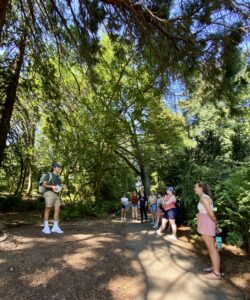
Created by recent graduate Owen L. Oliver (Quinault/Isleta Pueblo), the tour guides you through stories of place across seven locations on campus. You can pick up a copy of the walking tour booklet at the University Book Store, on the American Indian Studies website or experience the tour virtually.
Watch Gather
he EarthLab Learning Collective offered a free screening of Gather to our staff this summer. Gather is a documentary about Indigenous food sovereignty. The film beautifully captures efforts to rediscover identity through ancestral foods.
“The industrial revolution is over. Now, if we want to survive, if we want to carry on life on Earth, we need to be a part of the restorative revolution,” – Samuel Gensaw (Yurok), activist
Learn more about the film, the stories featured, and how to watch on the Gather Film website.
Be in Community
Explore these resources for UW students, faculty and staff:
- First Nations @ UW undergraduate intertribal registered student organization RSO
- UW Native Staff and Faculty Association
- UW Tri-Campus Resource List
- UW Combined Fund Drive
Our Top 10 Stories of 2021
In 2021, EarthLab welcomed new partners, strengthened our commitment to equity and justice work, and continued our work to inspire and incentivize innovative, community-centered environmental and climate justice research. Explore our top stories below.
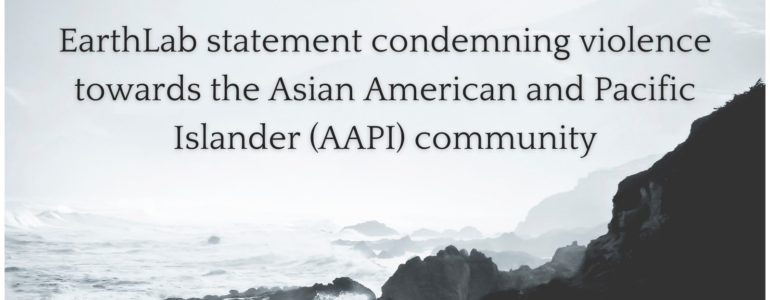
10. EarthLab statement condemning violence towards the Asian American and Pacific Islander (AAPI) community
EarthLab staff stands with the University of Washington and Nature and Health against the racially-motivated violence and hate crimes towards the Asian American and Pacific Islander (AAPI) community.
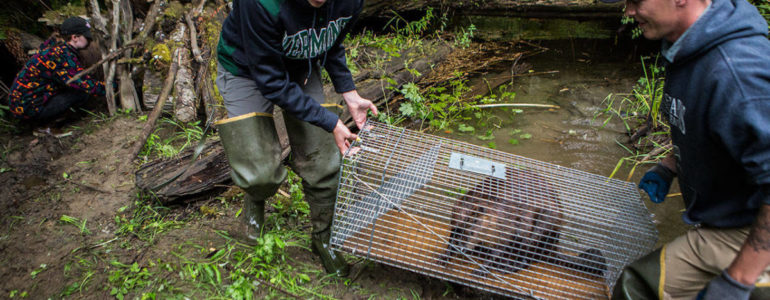
9. For tribes, climate change fight is about saving culture
Meade Krosby, a senior scientist with the UW Climate Impacts Group, is working with the Tulalips to determine the impacts on tribally important plants. The Tulalips have been leaders in organizing meetings, conferences and workshops around climate change.
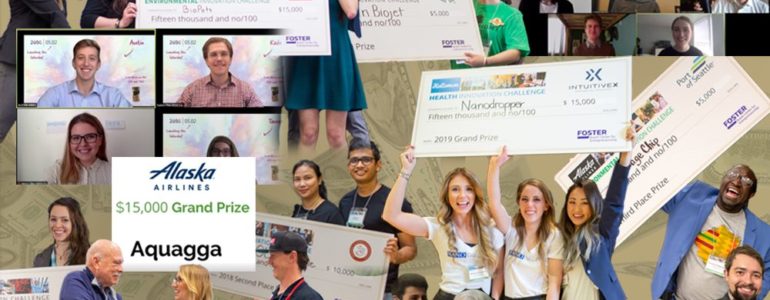
8. Innovative new prizes add to competition experience
EarthLab is proud to sponsor a prize at the Alaska Airlines Environmental Innovation Challenge, presented by Foster School’s Buerk Center for Entrepreneurship. The Community Impact Prize recognizes innovation in developing a product, solution, or demonstrated business model that mitigates or makes communities more resilient in the face of climate change while prioritizing equity and justice.
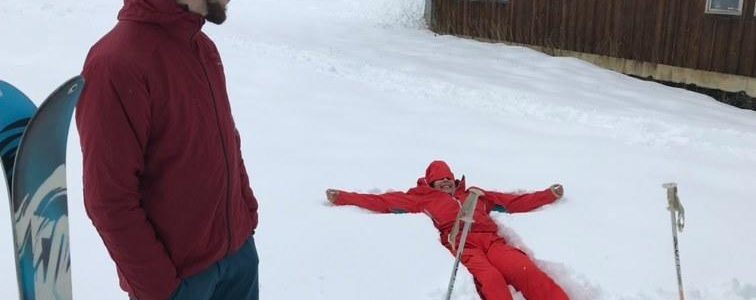
7. How to avoid cabin fever in WA’s pandemic winter
With each passing month, more and more Washingtonians are suffering under the physical, emotional and financial damages of enduring a lengthy pandemic. And as we find ourselves in the coldest, darkest days of the year during the worst-case surge yet, it can feel like a herculean task just to take a daily walk around the block. (Crosscut)
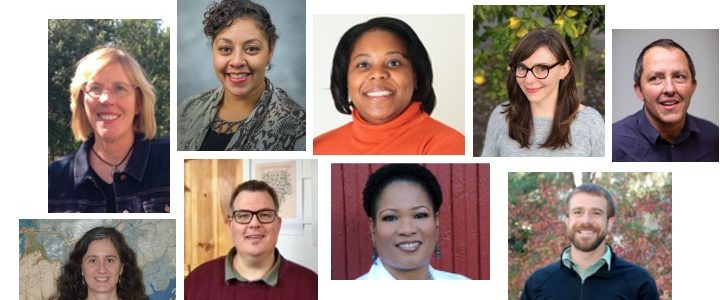
6. Project to create anti-racism education wins Mellon grant
Cleo Woelfle-Erskine, faculty advisor for EarthLab member organization Future Rivers and assistant professor in the School of Marine & Environmental Affairs, is part of a team of academics that was recently awarded $5 million from the Andrew W. Mellon Foundation to fund an interdisciplinary, multi-year project to advance anti-racist practices and pedagogy in science, technology, engineering, mathematics and medicine (STEMM).
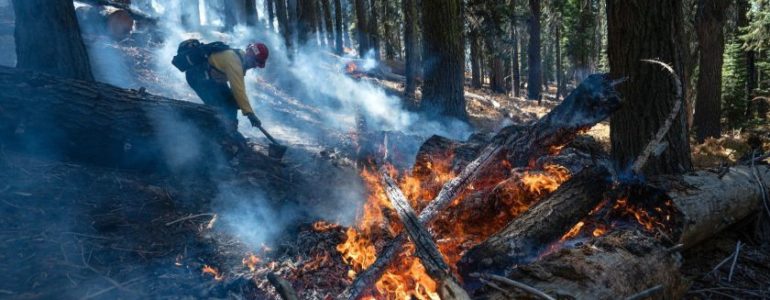
5. EarthLab and Population Health co-fund pilot grant to improve communication around smoke exposure in rural and tribal communities
EarthLab and the Population Health Initiative have announced a new pilot research grant award to study how Tribal and non-Tribal communities in the Okanogan River Airshed Emphasis Area (ORAEA) receive and communicate information about smoke exposure.
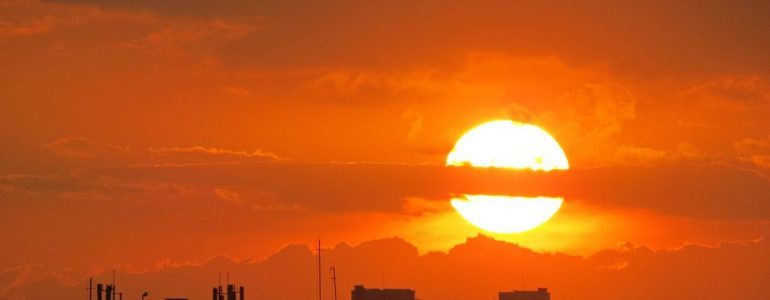
4. Burning Embers: Synthesis of the Health Risks of Climate Change
Additional climate change is projected to increase for heat-related morbidity and mortality, ozone-related mortality, dengue and Lyme disease from undetectable to severe risks as the planet continues to warm, according to new research published by the Center for Health and the Global Environment (CHanGE) at the University of Washington.
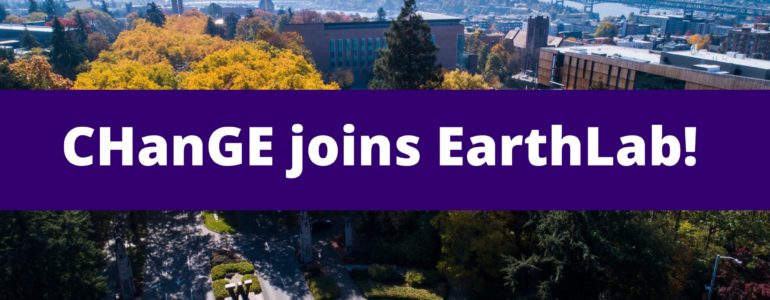
3. CHanGE comes to EarthLab
New collaboration between UW Center for Health and the Global Environment (CHanGE) and EarthLab will accelerate climate research, action and resilience.
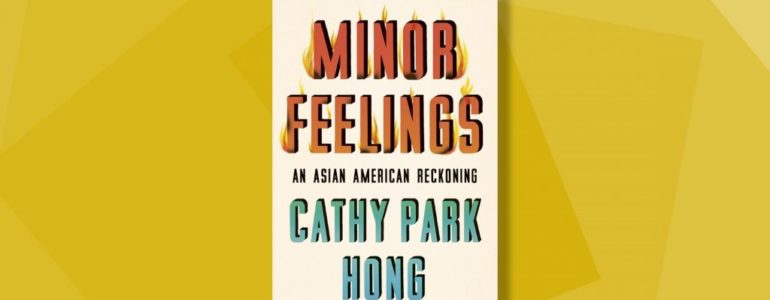
2. EarthLab equity and justice reads: Minor Feelings: An Asian American reckoning
EarthLab has selected Minor Feelings: An Asian American Reckoning by Cathy Park Hong for our equity and justice book club this quarter. This book was selected from several works written by and about the Asian-American experience.
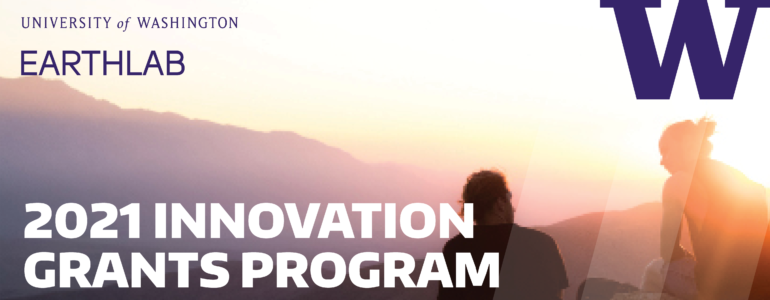
1. Announcing the 2021 EarthLab Innovation Grants RFP
The Innovation Grants Program will invest in teams of community partners and academic researchers and students at the University of Washington (UW) who are interested in developing solutions at the intersection of climate change and social justice.
EarthLab Equity and Justice Reads: Mississippi Solo (Eddy Harris)
EarthLab has selected the next book for our Equity and Justice book club: Mississippi Solo by Eddy Harris. The publisher writes about the book,
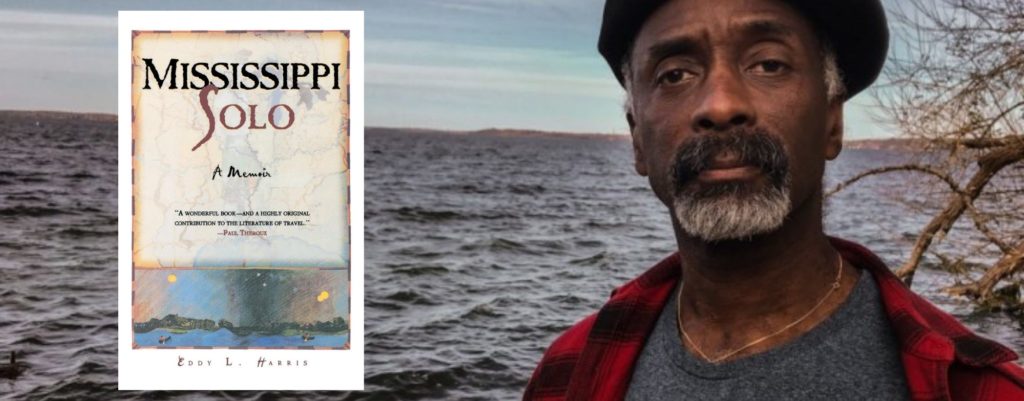
“In this exciting reissue of his classic travelogue, readers will come to treasure the rich insightful prose that is as textured as the Mississippi River itself. They will be taken by the hand by an adventurer whose lifelong dream is to canoe the length of this mighty river, from Minnesota to New Orleans. The trip’s dangers were legion for a Black man traveling alone, paddling from ‘where there ain’t no black folks to where they still don’t like us much.’
Barge waives loom large, wild dogs roam the wooded shores, and, in the Arkansas dusk, two shotgun-toting bigots nearly bring the author’s dream to a bloody nightmare. Sustaining him through the hard weeks of paddling were the hundreds of people who reached out to share a small piece of his challenge. Mississippi Solo is a big, rollicking, brilliant book, a wonderful piece of American adventure, and an unforgettable story of a man testing his own limits.”
This selection aligns with the Future Rivers summer reading. Future Rivers will host Mr. Harris at the University of Washington on Thursday, October 14 for an in-person screening of his film, River to the Heart, followed by a moderated Q&A with the author and director. This event will be in person, free and open to the public.
EarthLab Equity and Justice Reads: Minor Feelings: An Asian American Reckoning (Cathy Park Hong)
EarthLab has selected Minor Feelings: An Asian American Reckoning by Cathy Park Hong for our equity and justice book club this quarter. This book was selected from several works written by and about the Asian-American experience. EarthLab staff and member organization members will meet virtually on Tuesday, June 8 to discuss themes as part of our commitment to continuous equity and justice learning.
Minor Feelings: An Asian American Reckoning (Cathy Park Hong)
The publisher writes:
Poet and essayist Cathy Park Hong fearlessly and provocatively blends memoir, cultural criticism, and history to expose fresh truths about racialized consciousness in America. Part memoir and part cultural criticism, this collection is vulnerable, humorous, and provocative—and its relentless and riveting pursuit of vital questions around family and friendship, art and politics, identity and individuality, will change the way you think about our world.
Binding these essays together is Hong’s theory of “minor feelings.” As the daughter of Korean immigrants, Cathy Park Hong grew up steeped in shame, suspicion, and melancholy. She would later understand that these “minor feelings” occur when American optimism contradicts your own reality—when you believe the lies you’re told about your own racial identity. Minor feelings are not small, they’re dissonant—and in their tension Hong finds the key to the questions that haunt her.
With sly humor and a poet’s searching mind, Hong uses her own story as a portal into a deeper examination of racial consciousness in America today. This intimate and devastating book traces her relationship to the English language, to shame and depression, to poetry and female friendship. A radically honest work of art, Minor Feelings forms a portrait of one Asian American psyche—and of a writer’s search to both uncover and speak the truth.
Read more about the EarthLab Equity and Justice book club here.
EarthLab statement condemning violence towards the Asian American and Pacific Islander (AAPI) community

EarthLab staff stands with the University of Washington and Nature and Health against the racially-motivated violence and hate crimes towards the Asian American and Pacific Islander (AAPI) community. Over the past year, 3,800 anti-Asian incidents were reported in the U.S., which represents only a fraction of the increase in acts of violence, hate and discrimination towards this community. We must work to dismantle the white supremacy that undercurrents this racism and discrimination in order to create an equitable, just and sustainable world.
We all have a responsibility to call out hate and bias and to create an environment that is free from fear and is inclusive for all. We’ve included some resources below to continue this work.
Awareness trainings:
AIA: Situational Awareness Workshop (March 23)
Bystander intervention trainings
Virtual, interactive harassment prevention & bystander intervention trainings
Safety, reporting and mental health resources:
UW Bias Reporting Tool
UW CareLink
SafeCampus
Asian Counseling and Referral Services
AAPI Covid-19 Needs Assessment Project
Stop AAPI Hate
What to Do If You’ve Been the Victim of a Hate Crime
Washington State Human Rights Commission
Nature & Health Speaks: Beyond Inclusive Design with The Eli’s Park Project
This article was originally published by Urban@UW.

The Eli’s Park Project is committed to carrying on Eli’s legacy of love through a community-led renovation of the Burke-Gilman Playground Park. They are working with the community to create an accessible, inclusive, nature-based park where people of all ages and abilities can find play and peace. The reimagining and manifestation of this new, inclusive Burke-Gilman Playground Park consists of four phases: Schematic Design, Design Development, Construction Documents, and finally, construction. There are additional efforts that are taking place simultaneously including ongoing community outreach, fundraising, and coordination with the project’s partners. The current design uses a parallel pathways concept that “celebrates our togetherness, while honoring our differences”. Two pathways encircle the park, winding together in parallel experiences of places and play. One path remains easily accessible for those who need smooth surfaces to navigate the park safely, while the other meanders off and loops back to offer a variety of experiences for those seeking challenges as they explore.
On February 10th, University of Washington’s Nature and Health invited The Eli’s Park Project to share their inclusive design process through the Nature and Health Speaks series.
Nature and Health is a group of community members, scientists and practitioners who are passionate about the connections between nature and human health and well-being. They establish connections between individuals to “contribute to the design of health-care, educational and community settings that benefit all people.” The Eli’s Park Project had the opportunity to talk to, learn from and connect with over 45 individuals doing incredible work in the local community and across Washington state and the nation.
During the event, participants shared the benefits of inclusive design processes for nature-based projects, the importance of building outdoor spaces to meet the needs of a wide variety of users, the challenges of engaging community during COVID and the need for including anti-displacement strategies into projects that have green outdoor spaces.
Star Berry (she/her), Program Manager of Nature and Health, left feeling “encouraged to think about what it means to be welcoming in addition to being accessible and…allowing for relationships and needs to build.”

